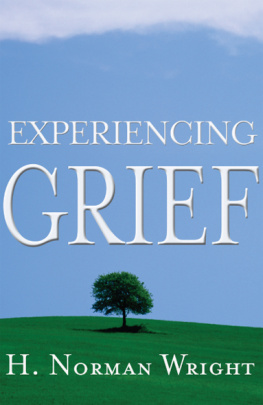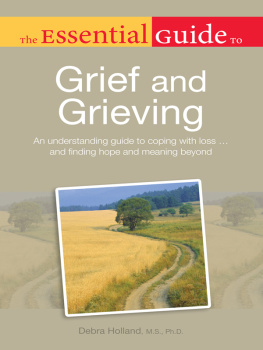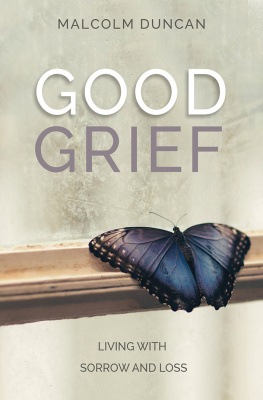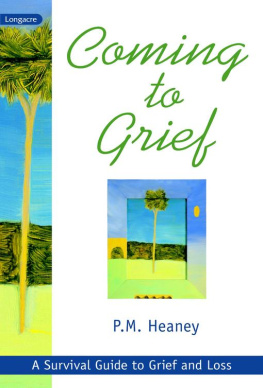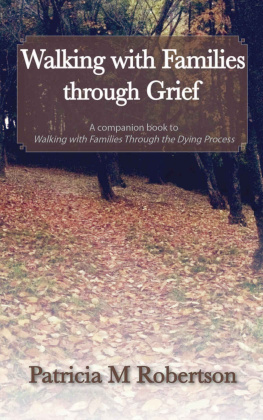
Good Grief
Good Grief
Granger E. Westberg
Foreword by Dr. Timothy Johnson, M.D.
Fortress Press
Minneapolis
To the memory of my sister Viola,
who helped so many find hope in the midst of grief
GOOD GRIEF
Foreword copyright 2011 Fortress Press, an imprint of Augsburg Fortress.
Afterword copyright 2011 Fortress Press
Preface copyright 1997 Augsburg Fortress
Original edition copyright 1971, 1962 Fortress Press
All rights reserved. Except for brief quotations in critical articles or reviews, no part of this book may be reproduced in any manner without prior written permission from the publisher. Visit http://www.augsburgfortress.org/copyrights or write to Permissions, Augsburg Fortress, Box 1209, Minneapolis, MN 55440.
Purchases of multiple copies of this book are available at a discount from the publisher. For more information, contact the sales department at Augsburg Fortress, Publishers, 1-800-328-4648, or visit fortresspress.com/westberg.
Good Grief is also available in hardcover, large print, and audio editions.
Based on a chapter from Minister and Doctor Meet, copyright 1961 by Granger E. Westberg.
Used by permission of the publisher. Harper & Row, Inc.
The quote on page 55 is from Peace of Mind. Copyright 1946 by Joshua Loth Liebman.
Interior photos: Stage One Marco Maccarini / iStockphoto; Stage Two Eugenia Garcia-Valdecasas / iStockphoto; Stage Three Selimaksan / iStockphoto; Stage Four Arno Jansen / iStockphoto; Stage Five Mlenny Photography | Alexander Hafemann / iStockphoto; Stage Six iStockphoto; Stage Seven AVTG / iStockphoto; Stage Eight Dean Turner / iStockphoto; Stage Nine Eva Serrabassa / iStockphoto; Stage Ten Jeremiah Deasey / iStockphoto
Cover art: Mist over Chilean mountains Image Source/Corbis
Cover design: Nicole Summers
Interior design: Hillspring Books
eISBN: 9781451409024
ISBN 978-0-8006-9781-5
Library of Congress Cataloging-in-Publication Data available
Contents
I had the great pleasure of getting to know Granger Westberg personally and professionally during my year of study at the University of Chicago Divinity School in 196061. He was on the faculty of both the Medical Center and the Divinity School. I was struggling with my faith journey as it was being vigorously challenged by the intense intellectual atmosphere of the Divinity School. My struggle was both physically and spiritually upsetting. In retrospect I realize I was grieving the loss of my simple childhood faith.
So I sought out the counsel of this pioneer in the chaplaincy movement. His gentle physical presence, kind smile, and soothing voice were immediately therapeutic. And his insights about the nature of my struggleand his reassurance about the normalcy of what I was experiencingwere more effective than any pill could possibly have been. Our dialogue that year became the basis for a lifelong friendship.
At about the same time, Granger wrote a short book encapsulating his vast experience with the many faces of grieving he had encountered in his work as a pastor, chaplain, and teacher. It was tantalizingly titled Good Grief and quickly became a best seller, with total sales to date of about three million copies! Its popularity is due in part to the fact that it talks openly about all kinds of grief, from loss through death to loss from divorce, being fired, moving, and struggles with children.
I just finished rereading this gem. It is immediately clear why it has been and will continue to be a best seller. It is written with the heart of a pastor, the insight of a psychologist, the humanity of a father and husband, and the hope of someone who has seen so many survive the process of grieving. It is simple but not simplistic. It is profound but not professorial. Most importantly, it describes the pathway through grieving that can only be found through honesty. This is a book that should be in the hands of anyone grieving for any reason.
Dr. Timothy Johnson, M.D.
I am deeply grateful that so many of you have found this little book helpful in your experience of grief.
I have learned during these many years that the various forms of loss that come our way need not be entirely damaging; they can, to some degree at least, also be life-enhancing. Suffering is not good, but you need not be devastated by it. Ultimately we can be healed of our bitterness and move ahead.
And so what can be the result of reading this book of good grieving?
We come out of our grief experience at a slightly higher level of maturity than before.
We come out of our grief as deeper persons because we have been down in the depths of despair and know what it is like.
We come out of it stronger, for we have had to learn how to use our spiritual muscles to climb the rugged mountain trails.
We come out of it better able to help others. We have walked through the valley of the shadow of grief. We can understand.
That is why I have chosen to call this little book Good Grief.
Granger E. Westberg
W e spend a good portion of our lives working diligently to acquire those things that make life rich and meaningfulfriends, a wife or husband, children, a home, a job, material comforts, money (lets face it), and security. What happens to us when we lose any of these persons or things that are so important to us?
Quite naturally we grieve over the loss of anything important. Sometimes, if the loss is great, the very foundations of our life are shaken, and we are thrown into deep despair. Because we know so little about the nature of grief, we become panicky when it strikes us, and this serves to throw us deeper into despondency. What can we learn about the grief process so that we can better cope with it?
Does peoples faith have anything to do with the way they grieve over whatever it is they lose? For instance, when we lose a job, or lose a loving friend, or fail in school, or are disliked by the people at the office because of our unpopular convictions, does our grief at these times have anything to do with our faith?
Faith plays a major role in grief of any kind. But not in the way some people think. They often seem to have the idea that a person with strong faith does not grieve and is above this sort of thing. Moreover, these people imply that religious faith advocates stoicism. They might even quote the two words from Scripture Grieve not! They forget to quote the rest of the phrase in which these two words are found: Grieve not as those who have no hope (1 Thess. 4:13).
But religious faithat least the Jewish-Christian faithhas never said that a truly religious person does not grieve. What it has said is that there are good ways and bad ways to grieve and that what a person considers to be of most importance in life will definitely affect the way he or she grieves.
Next page

